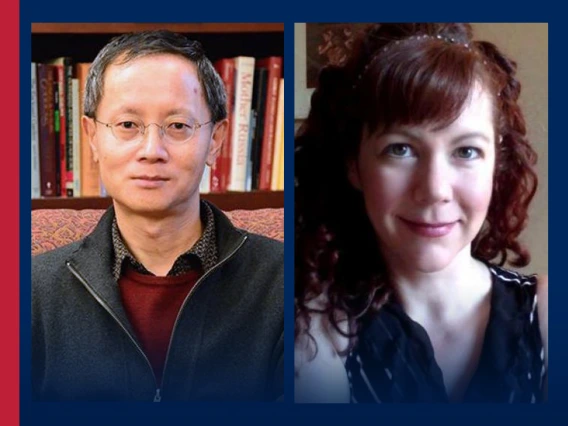
Two professors in the East Asian Studies Department have been promoted, demonstrating excellent performance in teaching, service and research.
Dr. Maggie Camp is promoted from Assistant Professor to Associate Professor of Practice.
Dr. Hai Ren is promoted from tenured Associate Professor to tenured Professor.
Camp specializes in Japanese linguistics and is an affiliated faculty member in Gender and Women’s Studies. She received her BA in Japanese and Linguistics from the University of Michigan, Ann Arbor and her MA and Ph.D. from the University of Arizona. She also studied at the Inter-University Center for Japanese Language Studies in Yokohama, Japan, and was a Fulbright Graduate Research Fellow at Keio University in Tokyo, Japan. Dr. Camp’s dissertation examines the relationship between gender and language in Japanese through the lens of sexuality, looking specifically at differences between the speech of Japanese lesbian and heterosexual women. Her current research interests include sociolinguistics, sociophonetics, experimental phonetics, gender/sexuality, language ideology, and second language teaching and use.
Ren (任海) is a Professor of East Asian Studies and Anthropology, an affiliated faculty in Gender and Women’s Studies, and Social, Cultural & Critical Theory. He is also a Distinguished Professor in the Department of Sculpture at Sichuan Fine Arts Institution in Chongqing, a top-ranking sculpture program in China. He received his BA in History and Archeology from Sichuan University in Chengdu, China, and a MA in Museum Studies and a Ph.D. in Sociocultural Anthropology from the University of Washington in Seattle. His current research interests include socially engaged art, public history, object-oriented anthropology, urban studies, comparative media and technology, public humanities and digital humanities, popular culture, and critical theory. He has written two books on social and cultural transformations of contemporary China:Neoliberalism and Culture in China and Hong Kong: The Countdown of Time(Routledge, 2010) and a sequel The Middle Class in Neoliberal China: Governing Risk, Life-Building, and Themed Spaces(Routledge, 2013).

